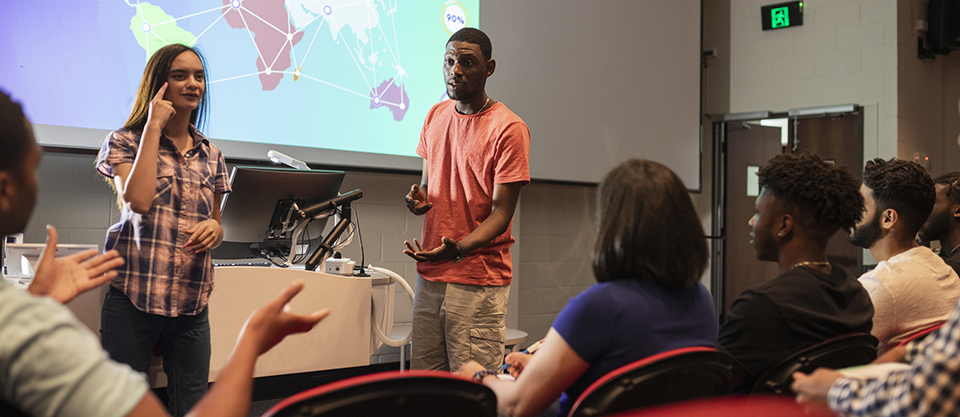Language is one of the most important parts of cultures around the world. As relations across the world continue to grow with the help of aspects such as advanced technology, connections between different people and their cultures have continued to grow as well. Because of this exponential growth of communication between people who speak different languages, the need for interpreters to help people understand each other has become prominent. Many cultures do not share the same language, resulting in the immense obstacle of a language barrier.
How do you define an interpreter?
Simply put, an interpreter is someone who translates speech for people who do not speak the same language. A community interpreter helps with a multitude of differing areas of communication for groups of people who may not speak the same language. Community interpreters have become extremely important as they often aid in the implementation of much needed community services in areas that may be struggling with aspects such as public health, educational facilities, or social services.
What Exactly Is Community Interpreting?
Community interpreting is a specific type of interpreting that can take place in many different communication settings. The main purpose of community interpreting is to make communication between two groups of people that don’t speak the same language possible. This communication between groups is needed to implement important community services. Community interpreting helps to break the massive obstacle that is a language barrier in order to help create public services for those who need them.
Community interpreting requires people that specialize in multiple different areas of languages and public services so that they are able to translate messages between groups. By translating messages between these groups, the community interpreter helps one group access or create community services in a specific area with the help of another. Language barriers are often an enormous issue when it comes to any sort of improvements or aid in many areas.
Many people in need of community interpreting services are immigrants or refugees, who are often families with children. It is not uncommon for families to move to other places where they may feel safer, but unfortunately, they may not speak the same language as the rest of the community around them. The need for public services, such as social security, family services and health care make community interpreting a vital resource for LEP (Limited English Proficiency) communities.
What Is the Difference Between an Interpreter and a Community Interpreter?
What is a language interpreter?
The most common type of interpreter that most people are familiar with is the basic translator known as a language interpreter.
What is the role of a language interpreter?
Sometimes referred to as an “intercultural mediator,” a language interpreter is fluent in multiple languages in order to translate back and forth between groups.
Interpreters often specialize in different areas, industries, and services to communicate within their different languages. This is where a community interpreter is created.
What does a community interpreter do?
They are specialized interpreters whose main job is to translate messages between different groups of people that don’t share a common language, so that providers of community and public services can help those who need them. Community interpreters provide services that may contain multiple underlying important roles within it. In addition to fluency in the target language, community interpreters must also specialize in the public services being used, as well as have extensive cultural knowledge and cultural sensitivity.
Because language barriers are a major obstacle to acquiring better public services, many areas struggle to implement them without a community interpreter to enable communication. Community interpreters help to implement public services such as healthcare facilities and educational and social services, which can completely transform people’s way of life. Without the aid of these individuals, it is likely that many people will go without the basic needs they need to survive and function in society.
What Areas of Community Interpreting Are There and What Do They Do?

A shot of a group of students at a lecture at a university in Perth, Australia. One of the students is living with hearing impairment is presenting a slideshow using sign language.
There are a variety of different domains within community interpreting that one might specialize in. Here are some of the common settings you may find a community interpreter in:
Educational Settings
Community interpreters can often be found in educational settings. Sometimes, a community interpreter can be a part of an educational team in order to help teach both children and adults who are not proficient in the same language as the teachers. Educational community interpreters enable communication between teachers, students, counselors, and more, helping to create a learning environment that is much more successful and comfortable.
Medical Settings
Another common setting community interpreters can be found in is the medical/healthcare area. Language barriers can be a large problem when it comes to getting access to the health services a person may need. Medical community interpreters translate for patients, doctors and healthcare providers, and even the patient’s family members. You can find them in hospitals, physicians’ clinics and offices, rehabilitation facilities, and more, enabling communication. This is not only beneficial for those who go to a nearby healthcare facility and don’t share a common language with those who work there, but also for people who may have had to travel for specific medical treatment and services.
Public and Social Services Settings
In some public and social service settings, a community interpreter may only be translating for an individual, depending on what the situation is. The social services domain of community interpreting tends to be one of the most common areas to specialize in because so many people need help with situations that fall under it. A community interpreter that specializes in public health and social services can be found in areas such as:
Public Housing and Transportation Services
Due to the large number of people that may not be fluent in English and pass-through public housing and transportation, community interpreters are often needed to ensure people get where they need to go.
Hospitals
Making sure that the medical personnel treating the patient understands what happened to the individual, and what the problem may be, is crucial to getting the patient the accurate help they need. Many people that aren’t fluent in English are often scared to go to the hospital because they know they might struggle to communicate. Having a community interpreter in areas where languages are mixed will help provide treatment for the patient in need.
Job Training Services
At many job training service companies, language is not a barrier that keeps them from hiring. But—it is important that the people being hired can understand, in detail, how the job works and what they need to do to be successful in it, as an important part of the learning process.
Refugee/Resettlement Centers
A majority of the people that may be passing through refugee or resettlement centers will most likely speak a different language than those who are running them. Having a community interpreter there to emphasize the needs of those seeking assistance, to the employees at the centers, will play a large part in their future.
Legal Settings
Another important area a community interpreter might specialize in is legal settings. In any kind of legal situation, clear communication is one of the key pieces of the process. Legal community interpreters can be found both in and out of courtrooms. Here are some of the most common legal settings you might find a community interpreter in:
Lawyer’s Offices
When it comes to most legal settings, especially those that involve lawyers, it’s important that the client fully understands what is going on during the proceedings. Because of this, community interpreters are often needed in lawyer’s offices.
Immigration Offices
Many people going through immigration services may not be the most fluent in English. Because this is a vitally important legal setting where many people pass through that struggle with English, many community interpreters are needed.
Police Stations/Prison and Detention Centers
In prisons and other detention centers, it’s crucial to make sure that the person being arrested or charged understands in full detail why everything is happening, especially if they don’t speak English proficiently. The same goes with police stations; if someone is brought in for questioning or is apprehended, community interpreters should be there to help.
Civil Rights Issues
Many civil rights issues actually occur from racial and ethnic biases that create disdain for people who may not be fluent in English (or the shared language around them). All civil rights issues that deal with any person that is considered to be Limited English Proficient (LEP) require a community interpreter.
In the Courtroom
Most people who are considered LEP will require an interpreter in the courtroom.
Business Settings
The business setting of community interpreting is not as utilized as often, mostly because community interpreting focuses heavily on community aid. But construction actually falls under this area of need, making it an important area to know about. Construction is one of, if not the biggest, aspect of most community interpreting aid because so many stages in the process of building, utilize it. Other business community interpreter settings are typically when two businesses meet, or a business meets a client, and a language barrier is present.
Why Is Community Interpreting Important?

Multiethnic women in colorful casual clothes discussing in the group meeting
Community interpreting is only becoming more and more necessary as connections around the world continue to grow. It has become colossally important to the daily lives of people all over the world by enabling communication.
Language barriers have unfortunately made it so that there is an imbalance of high-quality public services in some areas compared to others. Community interpreting helps provide access to so many basic things that most people don’t consider.
According to research by Migration Policy Institute, in 2013, approximately 61.6 million individuals, foreign and U.S. born, spoke a language other than English at home and about 41 percent (25.1 million) were considered Limited English Proficient (LEP).
The U.S. Census Bureau reports over 300 languages spoken in U.S. homes, as well as that 1 in 5 children that spoke a language other than English at home. This is why public and social services and communities require the widest range of languages needed.
Community interpreting is also particularly valuable when people may be nervous, under stressful conditions, or struggle to speak for themselves otherwise.
Benefits of Using a Community Interpreter
There are multiple benefits that come along with using a community interpreter:
Communication
Obviously, one of the biggest aspects that comes with using a community interpreter is the enabling of communication between two groups that couldn’t communicate otherwise. By breaking down the language barrier, a multitude of new things are possible for an area.
Implementing Public Services
A community interpreter’s main job is to help implement the creation of, or access to a variety of public and social services. Healthcare and educational facilities are often some of the biggest projects completed with a community interpreter. By giving areas public services that didn’t have them before, you can make a big difference in many different ways to benefit the community.
Minimizing Risks
By using a community interpreter, the risks of many situations can go down substantially. Especially in the medical and healthcare area, if a patient isn’t able to explain what happened to them or what they may need, it could be a life-or-death situation. Having an interpreter lowers detrimental risks like these.
People’s Lives Can Change
Many families that use a community interpreter were displaced or are even refugees. By having an interpreter to remove the obstacle of a language barrier, these families can find the public services they may need. Using a community interpreter to implement public services in an area that didn’t have many is also life-changing for many people who didn’t have access to basic amenities they may have needed.
Hiring a Community Interpreter Today

Group of three Caucasian and African Muslim office women discussing, wearing shawl and turban on head, sitting at table with a laptop and papers, technical support operator with headset working in call centre.
Language barriers present problems, but a community interpreter can knock those issues down. Ultimately, using a community interpreter can be helpful in a multitude of ways to many different people. Whether you’re helping patients and healthcare professionals communicate, or helping families find a safe place to live, a community interpreter will translate for you. People will always need to be connected.
At Propio Language Services, we know the value of language interpretation. Foreign language diversity and cultural diversity doesn’t need to become a roadblock to effective communication. As a trusted language service provider to over 1,400 organizations nationwide, it has been our mission for 26 years to provide the best quality interpretation services with a commitment to excellence in customer service, and innovation in interpretation technology. Propio is a leader in over-the-phone interpreter services and is ready to help you with any of your interpreting needs.
If your organization is in need of a more reliable language service provider, Propio can help! Get the fastest connection to U.S.-based certified interpreters.








